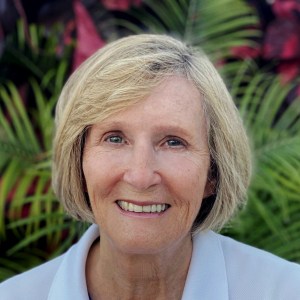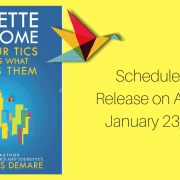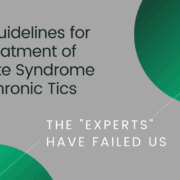The Gift of Discovering Tic Triggers: My Story
 Initially, my 8-year-old son’s symptoms of vocal and motor tics had developed gradually. Then, during the ensuing year, I watched helplessly as symptoms changed from simply being troublesome to creating emotional, social, and physical distress. Dealing with the tics, which were accompanied by uncharacteristic mood swings, began to consume my family’s days.
Initially, my 8-year-old son’s symptoms of vocal and motor tics had developed gradually. Then, during the ensuing year, I watched helplessly as symptoms changed from simply being troublesome to creating emotional, social, and physical distress. Dealing with the tics, which were accompanied by uncharacteristic mood swings, began to consume my family’s days.
A variety of chronic tics had developed, along with new obsessive tendencies. He was a popular, high-functioning student, but I watched his social life suffer.
We consulted a neurologist in West Palm Beach, Florida, who was highly recommended for dealing with tic disorders. After making the diagnosis of Tourette’s in my son, the doctor told us that the condition is genetic and there was no cure. He advised that medications could be used, but he warned against their side effects.
We should be aware, he said, that the tics will come and go on their own, and the term for this is waxing and waning. He added with a smile that I am sure was meant to be comforting: “No one ever died from Tourette syndrome.”
We returned home from the clinic feeling more frustrated and hopeless than when we had arrived. A no-cure label applied to my child’s symptoms was of little use. I needed to know what I could do to truly help my son. If a mother’s tears could have cured him, I would not be writing this.
I was a single parent in Florida with three kids, working full-time as a school psychologist and desperately wanting to help my child.
The turning point
I wondered: How could a happy-go-lucky, terrific kid now have an out-of-control body that was impacting so much of his life? Why was this happening, and was I just supposed to accept it? The entire situation did not make sense. I began searching for alternative approaches, which was not easy in the 1990s. Little was available online, so I scoured books and literature at the library.
The most accessible information was on drug therapy, and after reading about their side effects, I knew they would need to be a last resort.
Meanwhile, symptoms worsened. One day, I was at home when my son came through the front door with major motor and vocal tics. He was in distress; the symptoms were much worse than usual. He went to his bedroom to be alone, and just then the phone rang. It was my sister, a neurologist, calling long distance. When I heard her voice, I burst into tears. I could not bear watching my son tormented in this way. She knew we had already consulted a specialist and calmly said, “You never know, Sheila. Maybe someday you will be able to help other people who are dealing with Tourette’s.” Nothing could have seemed more unlikely.
When the school year ended and summer break began, we drove to a small condo on the west coast of Florida for a week’s vacation. I told my son and his two older sisters that we would celebrate school being out and they should enjoy themselves. I allowed them to spend lots of time in the community pool and to walk to a nearby convenience store for a treat each day. I also lightened up with meals, allowing more “fun” items than I usually would.
Surely the tics would be better, I thought. My son could now relax, with no peer pressure or school work. Yet, to my surprise the symptoms were worse. I was heartsick and confused.
It was hot and humid when we stopped at a motel for an overnight stay on the drive home. After checking in, I called for maintenance because the air conditioner was not working in our musty-smelling room. We watched in disgust as the repair man removed a vent cover from the ceiling and thick globs of discolored slime cascaded down in long strands. He matter-of-factly stated the obvious, telling us that the vent needed cleaning. We left the room so he could work on it, and came back later to sleep.
That evening I watched my boy as he stretched out on top of the bed and closed his eyes to sleep. He looked so sweet in his summer shorts, his skin tanned after a week in the sun. But I was soon dismayed. For the first time, his entire body was in spasm. His arms, legs, and back all had little twitches coming and going. I instinctively dropped to my knees with a desperate prayer—a prayer that when I took my child back to the doctor for the drugs that we could no longer avoid, he would still be able to function and have a happy life.
Moving in a new direction
Once back home and before connecting with our neurologist, I fortunately heard from another mother in Florida, Ginger Wakem. She had started an informal alternative therapy network, with the goal of sharing information about an allergy connection to tics. Ginger told me about a doctor who had reversed her son’s severe case of Tourette’s. I made an appointment right away. Now retired, Dr. Albert Robbins, an allergist and environmental physician, provided specialized allergy therapy for my son and also taught us about food reactions, nutritional imbalances, and chemical sensitivities. I will forever be grateful to both Ginger and Dr. Robbins. For the first time, I had new hope for my child.
We learned from the doctor how the immune system, the environment, diet, and allergy can affect the nervous system and the brain, triggering tics. When these types of issues were addressed, my son’s tic symptoms disappeared, along with the behavioral and emotional concerns.
When we were lax, issues began to resurface, at which time we would quickly tighten up our efforts. Within a few weeks, there was observable improvement and we knew we were on the right track. Within six months, a devastating condition had been brought well under control. We were thrilled with the results.
Putting it all together
Before this experience, I did not know people could react negatively to low levels of common toxins like cleaning products and scented items. I had no idea that sugars, certain foods, allergens, and synthetic additives could affect behavior and aggravate tics. I did not know that the health of the digestive system was connected to the functioning of the brain and nervous system.
If someone had asked me before this healing if I had ever noticed triggers for my son’s tics or his behavioral changes, I would have said no. I never knew to look! In fact, I was not even aware that he was allergic. Neither his pediatrician nor his neurologist ever brought up the possibility.
I thought back to our tic-filled vacation week. The things I had assumed were great ideas—lots of time swimming in the (chlorinated) pool and being able to enjoy junk-food treats that were not usually allowed at home—were actually harmful for him. And the experience at the musty motel allowed me to see firsthand how a mold exposure could affect the nervous system and cause muscle spasms. It was a real eye-opener, but only in retrospect. Plus, had the exposure not been so glaring, I do not think I would have made the association between mold and tics.
Here is just some of what I learned with our physician’s help over the first few months of this new approach:
- A number of foods and drinks were clearly making tics worse.
- My son had a systemic candida overgrowth that was affecting digestion.
- I was unaware he had a dust allergy and dust control measures were needed.
- Insect bites increased tics temporarily.
- Exposure to scented personal products and strong cleansers increased tics.
- A mold allergy was affecting symptoms.
- He had a major reaction to standard pesticide products, like bug spray.
- Specialized allergy therapy was needed, with nutritional deficiencies treated.
Efforts to spread the word: ACN Latitudes begins
Like most in the Tourette community, I had believed that my child’s tics were inevitable and out of our control. A new world had now opened up for us. The treatment for my son was a complete success, and he never needed medications.
Without a doubt, the recovery was not a coincidence, nor did he “outgrow” the problem. His body was healed. While nutritional balancing and a specialized allergy treatment were important parts of his therapy, identifying and avoiding triggers played a critical role. If we had overlooked his triggers, full recovery would not have been possible.
One day, I learned that the national Tourette Syndrome Association (now the Tourette Association of America) had received reports of successful natural therapies for tics and descriptions of tic triggers, for many years before our family’s struggles began. Yet, the public was not informed of these reports.
At their request, I began serving as a volunteer liaison to this association’s medical advisory board. After several years, it was clear that I was unable to bring about change, unable to get them to widen their view of the underlying causes of Tourette syndrome beyond genetics. They showed no interest in exploring dietary, allergic, and environmental connections to tics, and we ended the liaison connection.
I recall the chairman of the board at that time suggesting to me that I was misguided, that my son would have recovered spontaneously anyway. My response was: “It is rather offensive to be told that I did not see something that I very clearly saw.” Much of my son’s suffering and our family’s distress could have been avoided if we had known about the possibility of different types of triggers for tics.
Tic disorders can impact all aspects of life, from achievement and careers to relationships, family life, self-esteem, and personal goals—not to mention physical well-being. It is not enough for advocacy organizations to spend millions of dollars every year raising awareness, sharing strategies for coping with tics, giving educational support to families and school staff, and striving to reduce bullying. These are all noble efforts. However, families and patients need to know everything they can possibly do to reduce symptoms, and this includes being aware of potential triggers.
Eventually, Ginger Wakem requested that I take the lead with her alternative therapy effort. I developed a newsletter with an advisory board comprised of leading specialists in integrative medicine, and in 1996 I founded the 501(c)3 nonprofit Association for Comprehensive NeuroTherapy (ACN). The website Latitudes.org followed. I wanted to spread the message that the treatment of tic disorders should include a “comprehensive” range of integrative approaches. Other neurological conditions, including ADHD, OCD, autism, behavior and learning problems, PANDAS/PANS, and depression, are among the focus of our organization.
We are encouraged by the growth of our nonprofit association and the positive response we have received to our efforts. We are also pleased that our book, Natural Treatments for Tics & Tourette’s: A Patient and Family Guide, was an Amazon bestseller on the topic of Tourette syndrome for many years.
Natural Treatments for Tics and Tourette’s is the only comprehensive guide on how to treat tics, twitches, and related neurological conditions using a variety of natural and alternative or integrative therapies. More recently, ACN launched StopTicsToday.org to raise much needed funds for research. In 2018, I wrote Stop Your Tics by Learning What Triggers Them, from which this article has been adapted.
We urge readers in the tic community to explore their treatment options and share success when they achieve it.
Read other parent success stories
Our books document many positive responses enjoyed by families dealing with tics when they found natural approaches that worked for them, whether with or without conventional treatment. Our website also features success stories that offer tips and insights for families. Read these success stories here.
The Tourette community finds better answers for those suffering from tics when we explore and share together.
___________________










Is your book available in Spanish?
I wish it was available in Spanish, Blond! We need to work on translations, that would be so helpful for many people.
Sheila, I just want to say that the work you’ve done has been such a help to our family. Thank you for sharing your story. We live overseas and it’s so hard to find information like this.
Thank you, Marilyn–your note means so much to me and our organization. It’s wonderful these days that if people search enough online, they can find answers to pursue for Tourette’s, even while conventional doctors and support groups ignore the helpful avenues that open-minded practitioners and many families have been reporting for decades. I wish you and your family all the best and am so glad you have found help!